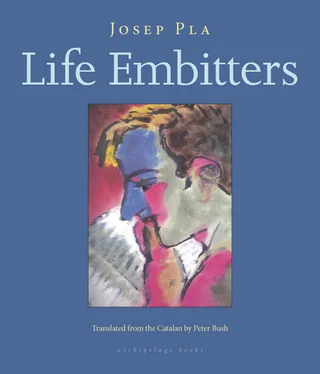Josep Pla - Life Embitters
Здесь есть возможность читать онлайн «Josep Pla - Life Embitters» весь текст электронной книги совершенно бесплатно (целиком полную версию без сокращений). В некоторых случаях можно слушать аудио, скачать через торрент в формате fb2 и присутствует краткое содержание. Год выпуска: 2015, Издательство: Archipelago, Жанр: Современная проза, на английском языке. Описание произведения, (предисловие) а так же отзывы посетителей доступны на портале библиотеки ЛибКат.
- Название:Life Embitters
- Автор:
- Издательство:Archipelago
- Жанр:
- Год:2015
- ISBN:нет данных
- Рейтинг книги:4 / 5. Голосов: 1
-
Избранное:Добавить в избранное
- Отзывы:
-
Ваша оценка:
- 80
- 1
- 2
- 3
- 4
- 5
Life Embitters: краткое содержание, описание и аннотация
Предлагаем к чтению аннотацию, описание, краткое содержание или предисловие (зависит от того, что написал сам автор книги «Life Embitters»). Если вы не нашли необходимую информацию о книге — напишите в комментариях, мы постараемся отыскать её.
Life Embitters — читать онлайн бесплатно полную книгу (весь текст) целиком
Ниже представлен текст книги, разбитый по страницам. Система сохранения места последней прочитанной страницы, позволяет с удобством читать онлайн бесплатно книгу «Life Embitters», без необходимости каждый раз заново искать на чём Вы остановились. Поставьте закладку, и сможете в любой момент перейти на страницу, на которой закончили чтение.
Интервал:
Закладка:
Niubó the registrar was an absolutist by temperament, molded by a clear soft spot for melancholy and nostalgia. His singed mustache, sagging, half-open mouth, circumflex accented eyebrows and rather pert nose made him seem an awkward fellow who could be very fussy. He liked to use his nose in argument, and when conversing about the most serious subjects, that most human desire not to make a fool of oneself that characterized him vanished completely. He was a fierce advocate of what he called the indispensable interventions of morality and the iron hand of authority. Although he subscribed to such a facile, practical conception of the world, Donya Emília, the owner of the boarding house, was literally starving him to death.
I remember with the utmost sadness how easily his fellow diners could deprive him of his supper. They only had to play on his fondness for the past, the ever latent emotional pull of his memories. The Corpus Christi processions which he always attended in an official capacity had left memories that could never be erased.
“That year,” he would begin the very second the maid was putting down his plate of kidney beans, “all those carrying the float sported beards. They were a pleasure to behold. They were so regal! I was eighteen. (Tired of waiting, the maid started clearing away.) I went to a barber’s shop that a Totusaus ran on the Plaça del Rei. I had a curl and comb. (The maid hesitated for one last moment, and then walked forcefully down the passage.) Afterwards I went to the Plaça de Sant Jaume. My colleagues on the Committee of the Society for Aspiring Registrars were there waiting for me. When I grabbed the flag rope I didn’t know what overcame me. I could see the entrance to Bethlehem, the ox and mule, the Mother of God, baby Jesus, my uncle the priest, Sr Manyé i Flaquer and Don Cándido Nocedal. I felt all aflutter and my eyes went on the blink. The emotions stirred by religion are ineffable.” (The maid reappeared with a tray of fried eggs and began serving.) “It was hot. The sky was a deep blue. The square was packed and the faces expressed the bliss everybody in Barcelona feels on the day of Corpus Christi. It is our main festive day: it is ‘our last shout.’ ” (This little phrase, from the gaming tables, was a consequence of Sr Niubó’s friendship with Sr Pastells.) “My curls were a constant irritation and my neck was making me sweat. Now and then a jolly priest walked by, or a gentleman with a top hat and a stoop, one eye that bulged more than the other, and a broad grin beneath his nose.” (The fried eggs were placed to the right and opposite Sr Niubó the registrar; the maid stood and waited.) “The square was a jewel. The sky was full of pigeons. The people standing on balconies threw streamers, confetti, and broom nonstop. Behind us stood the musicians from the Seamen’s Refuge that had a very decent brass section.” (Tired of waiting, the maid started to remove things.) “I tell you it was a pleasure to behold. It had everything, and in abundance: the uniforms were dazzling, the priests were completely entranced, people were pious, and the enthusiasm and togetherness of the big day was palpable all around. Be under no illusions! The festive days in the year aren’t identical. Particular religious fiestas have their own special air and ineffable light. We sometimes had to stand in the square for two hours before moving off.” (The maid hesitated for one last second and then decided to head down the passage.) “It was gorgeous. The Civil Guard wore white pants. The musicians never stopped playing. The flags and pennants were ravishing. The monstrance was stunning and the profusion and wealth of damask bewildering … The Marquis de Castellvell’s carriage, as you all know, followed behind the powers-that-be … I think it is unrivaled as a carriage …”
It wasn’t that Sr Niubó was unable to pare down his descriptions. Sr Niubó was in complete control of his favorite set scenes; he held them in the palm of his hand. The lodgers’ entertainment, however, consisted in asking him peripheral questions, in order to elicit unnecessary explanations and gratuitous elaboration. The truth was that when our good man struck up, he held the stage for the whole of supper.
In the course of his historical disquisition, we almost always left the table, one after another, because the meal was over. The one who lingered on tended to be Sr Pastells, who never worried about being late. Sr Niubó often realized at the last minute, when he felt horribly empty, that he’d not eaten and complained bitterly in that nasal croak of his. As he couldn’t let off steam with anyone else, he took it out on polite Sr Pastells and reproached him quite unreasonably for what had happened. Donya Emília had to make peace more than once. They’d have come to blows. Donya Emília felt sorry for Sr Niubó and would have brought him an ice-cold, flattened fried egg. A sort of litho print of a fried egg. That made things even worse, because the miserable presence of that fried egg deepened his sorrow at his lost supper.
“These uncouth youngsters, these discourteous students,” said a livid, trembling, nasal Sr Niubó, “they’ll pay for this!”
Then he walked down the passage and, while turning his bedroom door handle, he’d seethe with rage and shout: “And you, Sr Pastells, are their accomplice, a turncoat …!”
Sr Pastells glanced at Donya Emília for a moment and Donya Emília at Sr Pastells and neither made any comment. They stood there as if they’d fallen asleep.
Sr Pastells was the most pitiful of the trio. He was a little fellow, dripping in rolls of fat, with a hoarse voice, bulging eyes, and a drooping, pencil-line moustache. The gaming tables had given his dead, white skin a greenish patina. Like all gamblers, he thought he could understand things with a sideways glance, but I have never known anyone so limp. It stood out a mile that he’d lived his life amongst blue-blooded people. The man’s body did, nevertheless, possess a single distinguishing feature: soft, plumpish, pock-marked hands that he waved absentmindedly. Over-pliant hands have always put me rather on edge. I detect in them symptoms of excessive deference, and possible smoldering resentment. Sr Pastells was an upstanding fellow, an excellent man, but his hands alarmed me.
At the beginning of June, we had the house to ourselves. The university year was at an end and the students departed. After three noisy, rowdy months, the boarding house enjoyed peace and quiet. Donya Emília could rest; she took the covers off the rocking chair and armchair and the maid then informed me she was often visited by a distinguished gentleman. “A Supreme Court judge,’ the maid said. I resumed work. I’d almost lost the habit. Niubó the registrar, Sr Pastells, and Sr Veciana the debt collector, also seemed to appreciate the relaxing calm. Mealtimes were an oasis of peace. The dubious practical jokes were no more. Sr Niubó missed no suppers. The din the students made at night, the racket in their bedrooms, the continual coming in and out, was replaced by a more orderly life. People tiptoed down the passage in their slippers.
However, one immediately realized it wasn’t necessarily for the best. The uproar in the boarding house, the students’ constant to- and fro-ing, their turbulent, quick-paced lives enveloped them in a hubbub and haze that made them seem almost normal. Now the place was tranquil, the boarders could be seen for what they really were: the smokescreens had gone. They were three hapless, poverty-stricken wretches: demoralized, subdued, and fearful, they tried to shield themselves behind an elemental display of childish vanity. The three were bachelors, had labored with great difficulty to save a little money and were, as the phrase goes, people who scraped by. Their faces bore the unmistakably withdrawn expressions of men who have lived constantly exposed lives without a corner where they could take refuge or anyone to wipe their misery away. They were at once unreal and ordinary, embittered and susceptible, childish and play-actors. I’d look at them during our meals sitting in a row under the print of Romeo and Juliet on their flower-bedecked romantic balcony that adorned the main stretch of wall, opposite a table strewn with dirty plates, knives and forks, and glasses with a drop of red wine, facing a Donya Emília, who chewed unenthusiastically and grimaced with her unsightly mouth. They were pitiful. They didn’t know what to say, what to do with their hands or what pose to strike. Sometimes Veciana looked warily around, then with a rush of Dutch courage made a banal statement or repeated what he had just read in the newspaper. Two words and he’d already slipped up and, trembling and blushing, he spluttered out strange drivel. The landlady would silence him with a withering look. The others dared not laugh or speak. They lowered their eyes in dismay, as if suffering a great calamity.
Читать дальшеИнтервал:
Закладка:
Похожие книги на «Life Embitters»
Представляем Вашему вниманию похожие книги на «Life Embitters» списком для выбора. Мы отобрали схожую по названию и смыслу литературу в надежде предоставить читателям больше вариантов отыскать новые, интересные, ещё непрочитанные произведения.
Обсуждение, отзывы о книге «Life Embitters» и просто собственные мнения читателей. Оставьте ваши комментарии, напишите, что Вы думаете о произведении, его смысле или главных героях. Укажите что конкретно понравилось, а что нет, и почему Вы так считаете.












